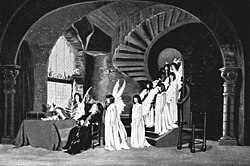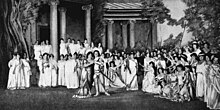Mefistofele
| Work data | |
|---|---|
| Title: | Mefistofele |

Faust's death |
|
| Shape: | Opera in a prologue, four acts and an epilogue |
| Original language: | Italian |
| Music: | Arrigo Boito |
| Libretto : | Arrigo Boito |
| Literary source: | after Goethe's Faust I and Faust II |
| Premiere: | 1) March 5, 1868 2) October 4, 1875 |
| Place of premiere: | 1) Teatro alla Scala , Milan 2) Teatro Comunale , Bologna |
| Playing time: | approx. 2 ½ hours |
| Place and time of the action: | Germany, around 1500, locations like in Goethe's Faust : study, garden, Brocken in the Harz Mountains, dungeon, Greece |
| people | |
|
|
Mefistofele is the only completed opera by the Italian composer Arrigo Boito . It consists of a prologue, four acts and an epilogue, is based on Goethe's Faust poems and was premiered on March 5, 1868 at La Scala in Milan . A second revised and abridged version was premiered on October 6, 1875 at the Teatro Comunale in Bologna after the original version had been heavily criticized.
action
The following table of contents refers to the second version from 1875.
Prologue in Heaven
The scholar Dr. Heinrich Faust reaches the limits of his ability to further increase his knowledge. Depressed, he searches for the knowledge of being. Awakened by this, Mefistofele, Faust's personified evil, makes a wager with God to try to dissuade him. If he succeeds in this, he will win over God and thus being.
first act
Frankfurt am Main, in front of the city gate
Faust and his pupil Wagner join the hilarious hustle and bustle of the citizens and peasants who attend the elector's departure. It is Easter Sunday. As dusk approaches, Faust notices a shady black monk wandering around.
Faust's study
The monk appears back in his study: It is Mefistofele. He offers Faust a pact that consists of serving Faust in life. After death, it should be the other way around. The luck-seeking Faust agrees, whereupon Mefistofele spreads his cloak and the two float away.
Second act
Rural garden
Through Mefistofele, Faust regained his youth and tried to impress the innocent Margherita. He gets her to give her mother a sleeping potion so that she can retire to the room with her. Meanwhile Mefistofele does the same with Marta.
Walpurgis Night in the valley floor of Schierke and Elend
Now Faust finds himself on the Brocken again, where the witches celebrate their Sabbath. Suddenly, however, he has a vision of Margherita who is tied up in a dungeon. Mefistofele, however, tears him bitterly from his dreams.
Third act
Dungeon, night
Margherita delusionally poisoned her mother and drowned her child. She is tied up in the dungeon awaiting her sentence. When she sees Faust and he tries to stop her from fleeing, she is delighted. However, when Mefistofele appears, her mood changes. She rejects Faust in horror. Margherita turns to God with a request for redemption, the heavenly hosts declare her redeemed.
Fourth act
Classic Walpurgis Night on the rocky bays of the Aegean Sea
In distant Greece, Faust woos the beautiful Helena, who sings about the battle for Troy. Ultimately, he confesses his love to her.
epilogue
Faust's study
Time has passed, old Faust is back in his study and ponders what happened in the search for perfect happiness. He begins to understand that only love for God and for himself can make him feel this way. He overcomes his shadow, Mefistofele, and also ascends redeemed into heaven.
layout

Instrumentation
The orchestral line-up of the second version contains the following instruments:
- Woodwinds : two flutes (2nd also piccolo ), two oboes (2nd also English horn ), two clarinets (2nd also bass clarinet ), two bassoons
- Brass : four horns , two trumpets , three trombones , serpent (also Ophikleide and Cimbasso )
- three timpani , percussion : thunder machine, bass drum , cymbals , tam-tam , triangle , hanging cymbals
- two harps
- Strings
- Incidental music ( banda ): two horns, two trumpets, three trombones, percussion (three small drums , cymbals, tam-tam, thunder machine), five bells, small carillon
Differences to Goethe's Faust I
Although Boito had Goethe as a model, there are some differences, be it missing scenes or changed course of the plot.
Some differences, each referring to the opera:
- The “prelude to the theater” is missing.
- The "Prologue in Heaven" has a much longer season than the narrative time in Faust .
- The first scene in the study is shorter and is limited to Faust's suffering.
- The black poodle with the "vortex of fire" has been replaced by a black monk.
- The second scene in the study has been cut and is limited to the pact.
- The chapter “Auerbach's Cellar in Leipzig” is missing.
- The “witch's kitchen” is also missing, so you don't find out how Faust regained his youth.
- Getting to know Margherita (Margarete) and her neighbor Marta (Marthe) is limited to a garden scene. All chapters from “Straße” to “Marthens Garten” are reproduced in compressed form.
- All other chapters up to “Walpurgis Night” are missing.
- The "Walpurgis Night" is limited to the vision of Margherita (Lilith).
- Again all scenes are missing up to the "dungeon".
- Like the prologue, the “dungeon” scene is longer.
Discography (selection)
Mefistofele has appeared many times on phonograms. Operadis names 40 recordings in the period from 1928 to 2008. Therefore, only those recordings that are particularly highlighted in specialist journals or opera guides are listed below.
- 1952: Franco Capuana (conductor), orchestra and choir of the Teatro alla Scala Milan. Giulio Neri (Mefistofele), Gianni Poggi (Faust), Rosetta Noli (Margherita), Ebe Ticozzi (Marta and Panthalis), Gino del Signore (Wagner and Nerèo), Simona dall 'Argine (Elena). Preiser PR90122 (2 CD), Cantus Classics 500330 (2 CD). FonoForum 8/92
- 1955 (heavily shortened, without 4th act): Vittorio Gui (conductor), orchestra and choir of the Teatro dell'Opera Rome. Boris Christow (Mefistofele), Giacinto Prandelli (Faust), Orietta Moscucci (Margherita), Amalia Pini (Marta), Piero de Palma (Wagner). EMI CD: 5 65655 2nd Hermes Opera Lexicon
- 1956: Angelo Questa (conductor), orchestra and choir of the RAI Turin. Giulio Neri (Mefistofele), Ferruccio Tagliavini (Faust), Marcella Pobbe (Margherita), Ebe Ticozzi (Marta), Armando Benzi (Wagner and Nerèo), Disma de Cecco (Elena), Ede Marietti Gandolfo (Panthalis). Cetra CD: CDO 19, Warner Fonit. Hermes Opera Lexicon
- 1973: Julius Rudel (conductor), London Symphony Orchestra , Ambrosian Opera Chorus . Norman Treigle (Mefistofele), Plácido Domingo (Faust), Montserrat Caballé (Margherita), Heather Begg (Marta), Thomas Allen (Wagner), Josella Ligi (Elena), Delia Wallis (Panthalis), Leslie Fyson (Nerèo). EMI CD: 5 66502 2, EMI CD: 7 49522 2, EMI Electrola LP: 195-02 464/66. Opernwelt CD tip: "artistically valuable"
- 1980–1982 (version from Bologna 1875, prologue slightly shortened): Oliviero de Fabritiis (conductor), National Philharmonic Orchestra London, London Opera Chorus. Nikolaj Gjaurow (Mefistofele), Luciano Pavarotti (Faust), Mirella Freni (Margherita), Nucci Condò (Marta), Piero de Palma (Wagner), Montserrat Caballé (Elena), Della Jones (Panthalis), Robin Leggate (Nerèo). Decca CD: 410 175-2, DECCA LP: D270D3. FonoForum 5/84
swell
- Booklet of the Badisches Staatstheater Karlsruhe for the production from the 2004/2005 season
- Wagner, Renate; New Opera Guide , 2nd edition 1979, Prisma Verlag / Wiener Verlag, ISBN 3-570-00974-2
- Goethe, Johann Wolfgang; Faust - The first part of the tragedy , 1986 edition, Reclam-Verlag, ISBN 3-15-000001-7
Web links
- Mefistofele : Sheet music and audio files in the International Music Score Library Project
- Libretto of the first version (Italian), Milan 1868. Digitized in the Internet Archive
- Libretto of the second version (Italian), Milan 1875. Digitized in the Corago information system of the University of Bologna
- Work information and libretto (Italian) as full text on librettidopera.it
- Mefistofele (Arrigo Boito) in the Corago information system of the University of Bologna
- Mefistofele [1875] (Arrigo Boito) in the Corago information system of the University of Bologna
- Plot and libretto of it at Opera Guide landing page for URL upgrade currently unavailable
- Discography of Mefistofele at Operadis
Individual evidence
- ^ Rainer Damm, Egon Voss : Mefistofele. In: Piper's Encyclopedia of Musical Theater . Volume 1: Works. Abbatini - Donizetti. Piper, Munich / Zurich 1986, ISBN 3-492-02411-4 , pp. 389-392.
- ^ Discography on Mefistofele at Operadis.
- ↑ a b c d CD tips on “Mefistofele” on klassika.info , accessed on November 26, 2015.
- ↑ a b c d e Arrigo Boito. In: Andreas Ommer: Directory of all opera complete recordings. Zeno.org , volume 20.
- ↑ Harenberg opera guide. 4th edition. Meyers Lexikonverlag, 2003, ISBN 3-411-76107-5 , p. 103.

